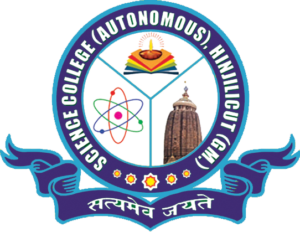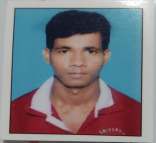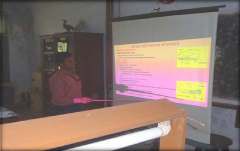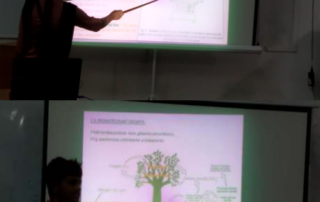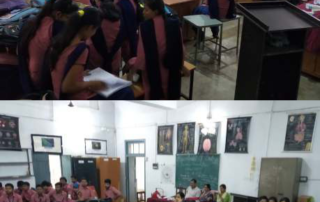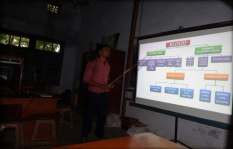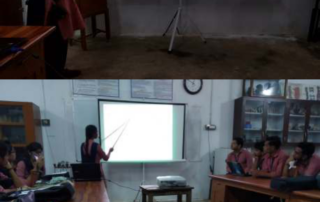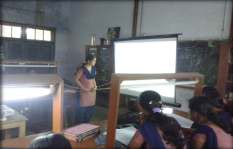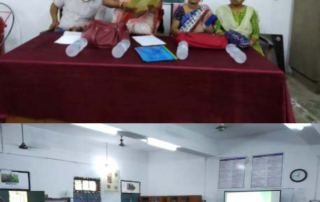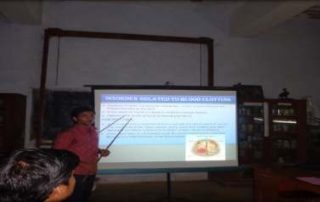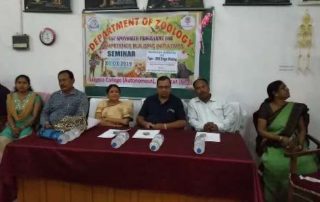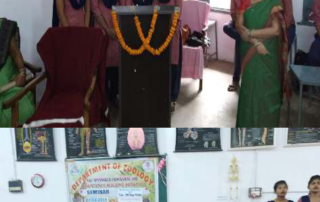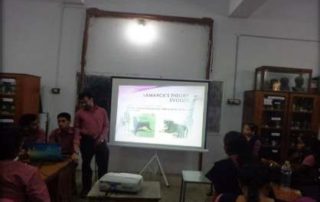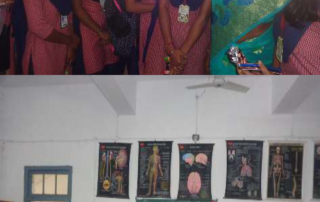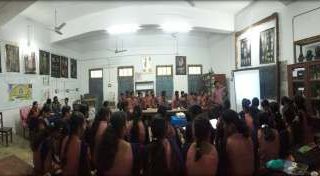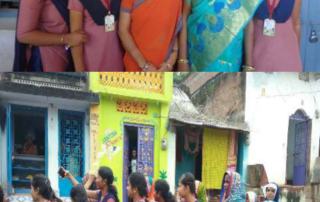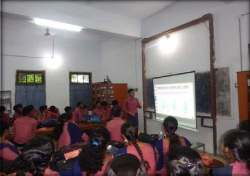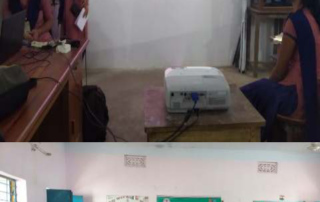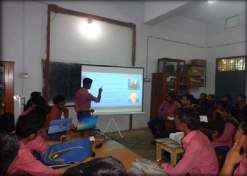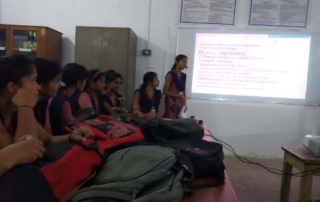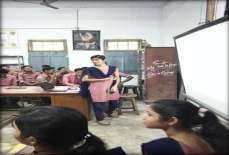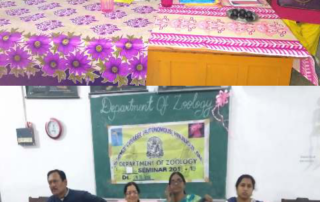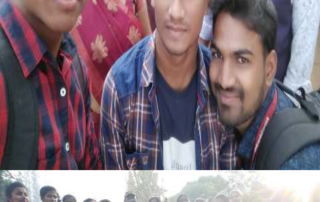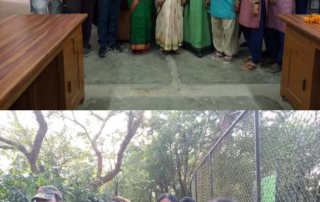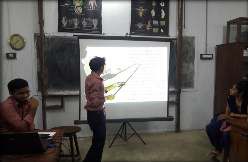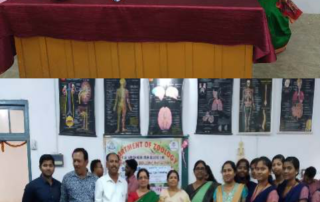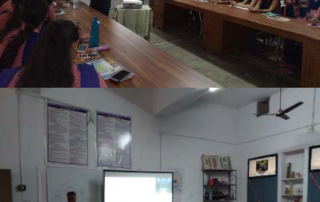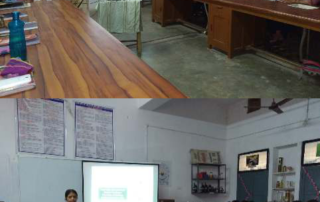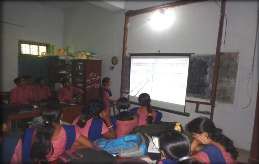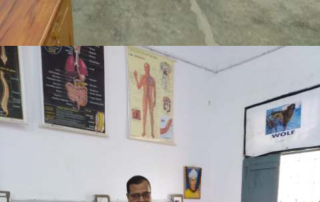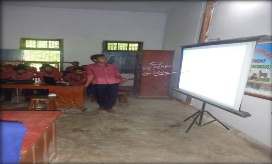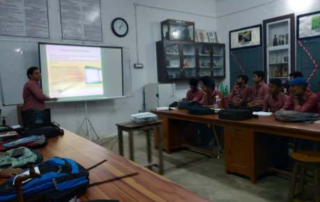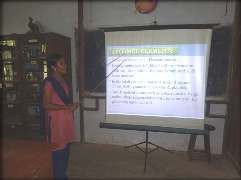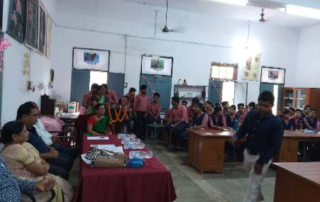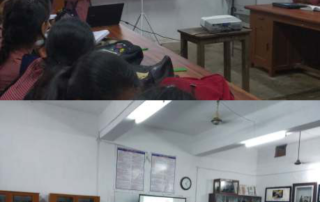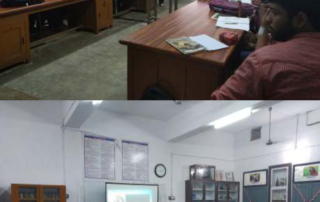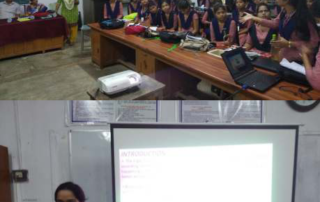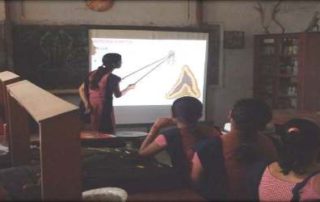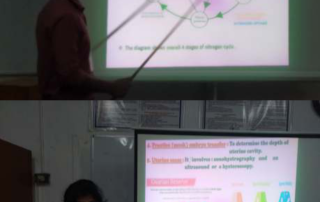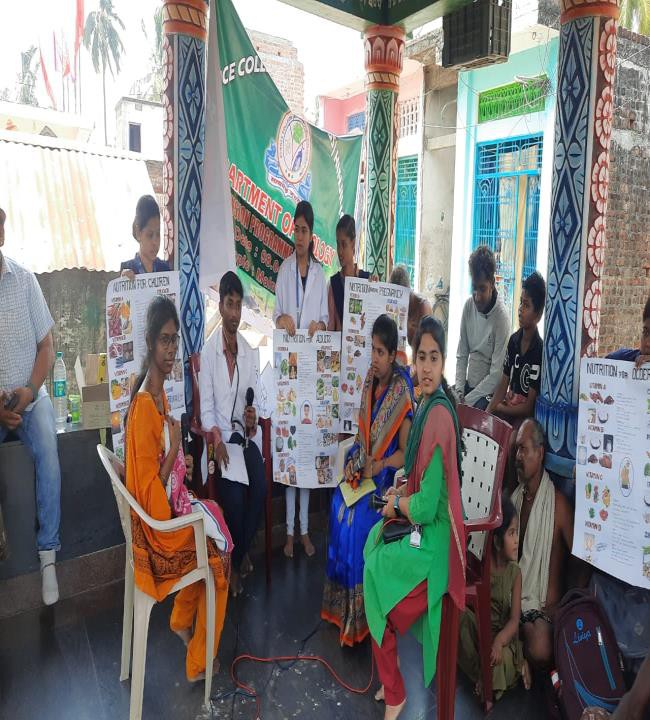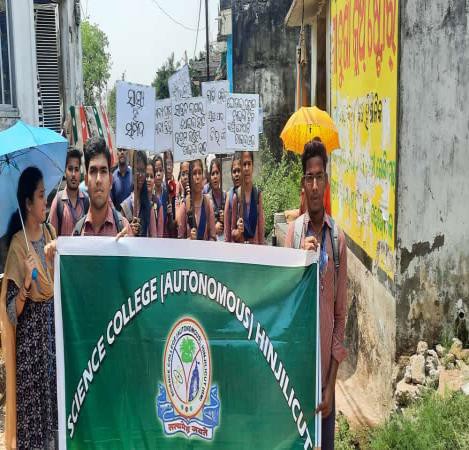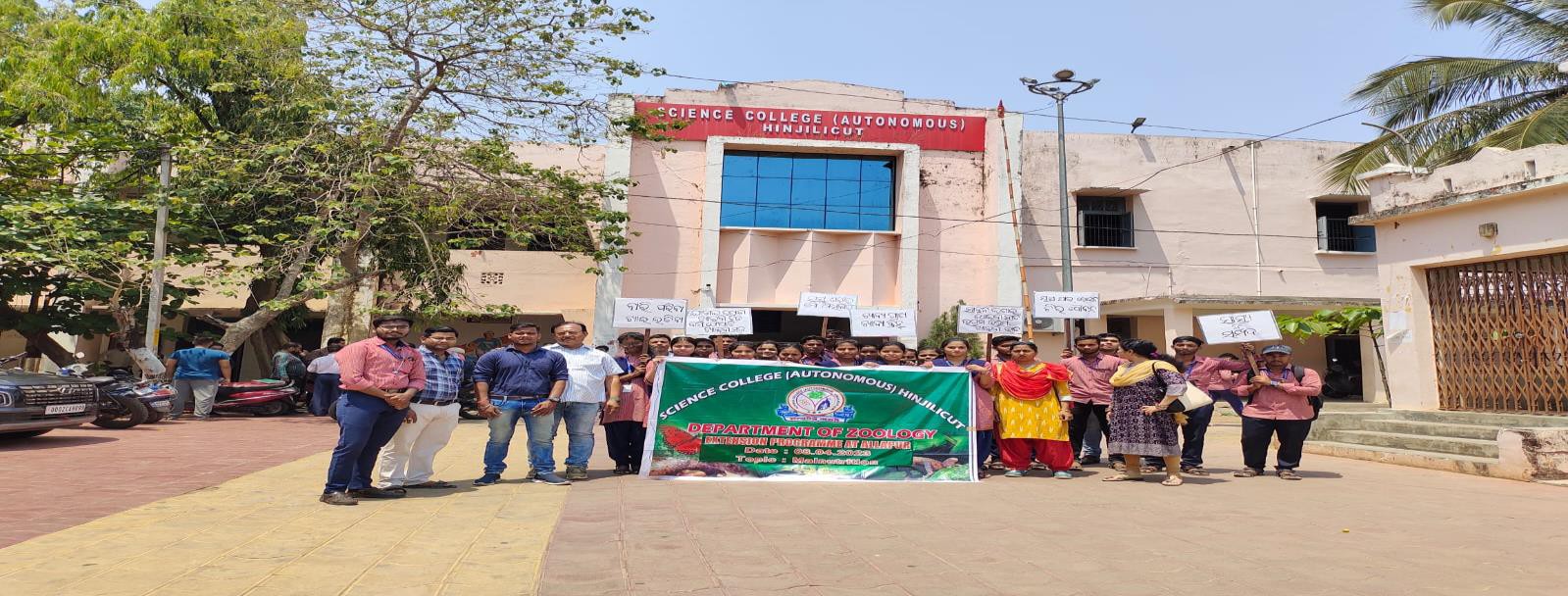To cater the human resources for the affluent people of this heartland region of Ganjam district and to drive the galvanic talents of budding youths many magnanimous leaders and elite mass incepted this prominent higher education institution named “ Science College” Hinjilicut in the year 1963 with intermediate science (Pre-University) class initially. This long cherished institution fostered the talented, but poverty striken deprived students in great way to reinforce their hopes and vision to win over the all facts of life. Their necessity encouraged the management of this institution and all the departments to ensure good shape, teaching and interaction with the jubilant students, youths and finely oriented people of the region. This persistent efforts and endeavours of the management and teachers was so tremendously synchronised that the institution grew in healthy no. of students, class room facilities, teaching aids, teachers no. Well defined results in academic and extracurricular activities. Subsequent attempts and necessary communications to the concerned authorities consequently resulted in opening under graduate (UG) on 1965-66 with 16 no. of pass seats in our subject, Zoology.
This department reached another milestone of academic dignity by opening honours seats (16) on 1977-78. The interested staff and students collected specimens of all possible phylum, classes from available sources and place them properly identified. Till date our students cooperate in reinforcement of the laboratory richness. Our pass out Hons. Students contribute their books to the department after they are placed in respective jobs. Also the tradition of contributing books by the teachers continues to harness the seminar activity. At par with our beloved institution our department executed with immense ecstasy when this college was declared as an “Autonomous” college in the year 2014-15. Our department whole heartedly contribute all its resources for augmented teaching aids, teaching facilities, practical work interaction with the students field activities etc. To justify the status of a premier college of South Odisha. Our department has developed the Choice Based Credit System (CBCS) curriculum during year 2015-16.The choice based credit system has been introduced to provide greater choice and flexibility & to prepare the students to compete with national and international level. The mission of our department is to impart quality education, promoting of innovation thinking, creating work culture among students.
Course Structure of U.G. Zoology Honours |
||||
| Semester | Course | Course Name | Credit | Total
marks |
| Semester-I | AECC I | Environmental Studies and Disaster management | 4 | 100 |
| Core I (Theory) | Non-chordates I: Protista
to Pseudocoelomates |
4 | 75 | |
| Core I (Practical) | Non-chordates I: Protista
to Pseudocoelomates |
2 | 25 | |
| Core II (Theory) | Principles of Ecology | 4 | 75 | |
| Core II (Practical) | Principles of Ecology | 2 | 25 | |
| GE 1 (Theory) | Animal Diversity | 4 | 75 | |
| GE I (Practical) | Animal Diversity | 2 | 25 | |
| Semester-II | AECC 2 | MIL (Odia Communication/ Alternative English) | 4 | 100 |
| Core III (Theory) | Non chordates II: Coelomates | 4 | 75 | |
| Core III (Practical) | Non chordates II:
Coelomates |
2 | 25 | |
| Core IV (Theory) | Cell biology | 4 | 75 | |
| Core IV (Practical) | Cell biology | 2 | 25 | |
| GE II (Theory) | Food nutrition and health | 4 | 75 | |
| GE II (Practical) | Food nutrition and health | 2 | 25 | |
| Semester- III | Core V (Theory) | Diversity of Chordates | 4 | 75 |
| Core V (Practical) | Diversity of Chordates | 2 | 25 | |
| Core VI (Theory) | Physiology: Controlling and Coordinating systems | 4 | 75 | |
| Core VI (Practical) | Physiology: Controlling and Coordinating systems | 2 | 25 | |
| Core VII (Theory) | Fundamentals of Biochemistry | 4 | 75 | |
| Core VII (Practical) | Fundamentals of Biochemistry | 2 | 25 | |
| SEC 1 | Communicative English | 4 | 100 | |
| GE III (Theory) | GE III (Theory) | 4 | 75 | |
| GE III (Practical) | GE III (Practical) | 2 | 25 | |
| Semester- IV | Core VIII
(Theory) |
Comparative anatomy of
Vertebrates |
4 | 75 |
| Core VIII | Comparative anatomy of | 2 | 25 | |
| (Practical) | Vertebrates | |||
| Core IX (Theory) | Physiology: Life Sustaining
Systems |
4 | 75 | |
| Core IX (Practical) | Physiology: Life Sustaining
Systems |
2 | 25 | |
| Core X (Theory) | Biochemistry of Metabolic
Processes |
4 | 75 | |
| Core X (Practical) | Biochemistry of Metabolic Processes | 2 | 25 | |
| SEC 2 | Quantitative & Logical Thinking | 4 | 100 | |
| GE IV (Theory) | GE IV (Theory) | 4 | 75 | |
| GE IV (Practical) | GE IV (Practical) | 2 | 25 | |
| Semester-V | Core XI (Theory) | Molecular Biology | 4 | 75 |
| Core XI (Practical) | Molecular Biology | 2 | 25 | |
| Core XII (Theory) | Principles of Genetics | 4 | 75 | |
| Core XII (Practical) | Principles of Genetics | 2 | 25 | |
| DSE I (Theory) | Animal behavior and cronobiology | 4 | 75 | |
| DSE I (Practical) | Animal behavior and cronobiology | 2 | 25 | |
| DSE II (Theory) | Immunology | 4 | 75 | |
| DSE II (Practical) | Immunology | 2 | 25 | |
| Semester- VI | Core XIII
(Theory) |
Developmental Biology | 4 | 75 |
| Core XIII (Practical) | Developmental Biology | 2 | 25 | |
| Core XIV
(Theory) |
Evolutionary Biology | 4 | 75 | |
| Core XIV (Practical) | Evolutionary Biology | 2 | 25 | |
| DSE III (Theory) | Fish and fishery | 4 | 75 | |
| DSE III (Practical) | Fish and fishery | 2 | 25 | |
| DSE IV (Theory with Practical
/Project) |
Project. | 6 | 100 | |
| Total | 148 | 2600 | ||
Course Structure of U.G. Zoology Honours |
||||
| Semester | Course | Course Name | Credit | Total
marks |
| Semester-I | AECC I | (Environmental Science) | 4 | 100 |
| Core I (Theory) | Non-chordates I: Protista
to Pseudocoelomates |
4 | 75 | |
| Core I (Practical) | Non-chordates I: Protista
to Pseudocoelomates |
2 | 25 | |
| Core II (Theory) | Principles of Ecology | 4 | 75 | |
| Core II (Practical) | Principles of Ecology | 2 | 25 | |
| GE 1 (Theory) | Animal Diversity | 4 | 75 | |
| GE I (Practical) | Animal Diversity | 2 | 25 | |
| Semester-II | AECC 2 | MIL (Odia Communication/ Alternative English) | 4 | 100 |
| Core III (Theory) | Non chordates II: Coelomates | 4 | 75 | |
| Core III (Practical) | Non chordates II:
Coelomates |
2 | 25 | |
| Core IV (Theory) | Cell biology | 4 | 75 | |
| Core IV (Practical) | Cell biology | 2 | 25 | |
| GE II (Theory) | GE II (Theory) | 4 | 75 | |
| GE II (Practical) | GE II (Practical) | 2 | 25 | |
| Semester- III | Core V (Theory) | Diversity of Chordates | 4 | 75 |
| Core V (Practical) | Diversity of Chordates | 2 | 25 | |
| Core VI (Theory) | Physiology: Controlling and Coordinating systems | 4 | 75 | |
| Core VI (Practical) | Physiology: Controlling and Coordinating systems | 2 | 25 | |
| Core VII (Theory) | Fundamentals of Biochemistry | 4 | 75 | |
| Core VII (Practical) | Fundamentals of Biochemistry | 2 | 25 | |
| SEC 1 | Communicative English | 4 | 100 | |
| GE III (Theory) | GE III (Theory) | 4 | 75 | |
| GE III (Practical) | GE III (Practical) | 2 | 25 | |
| Semester- IV | Core VIII
(Theory) |
Comparative anatomy of
Vertebrates |
4 | 75 |
| Core VIII | Comparative anatomy of | 2 | 25 | |
| (Practical) | Vertebrates | |||
| Core IX (Theory) | Physiology: Life Sustaining
Systems |
4 | 75 | |
| Core IX (Practical) | Physiology: Life Sustaining
Systems |
2 | 25 | |
| Core X (Theory) | Biochemistry of Metabolic
Processes |
4 | 75 | |
| Core X (Practical) | Biochemistry of Metabolic Processes | 2 | 25 | |
| SEC 2 | Quantitative & Logical Thinking | 4 | 100 | |
| GE IV (Theory) | GE IV (Theory) | 4 | 75 | |
| GE IV (Practical) | GE IV (Practical) | 2 | 25 | |
For the Syllabus CLICK HERE
Photo | Name & Designation |
Smt. Supriya Gupta M.Sc., M.Phil. Lecturer in Zoology | |
Sri.Papu swain M. Sc Lecturer in Zoology | |
Sri. Jitun Kumar Maharana M. Sc Demonstrator in Zoology | |
Seminar Library
- More than 350 books of several National and International Journals are available in the Departmental Seminar Library for the reference of students.
Computing
- One computer and internet facilities is available in the Department for the utility of students.
Laboratories
- Apart from specific laboratory for each of the +3. Ist year, IInd year & IIIrd year students, a common Departmental central Instrument facility is available in the Department.
- A museum consisting of more than 300 of different Zoological species organisms is available for the students in the Department.
Student Outings
- The Department, each year organizes minimum of one study-cum-field and a picnic-cum-excursion tour for the B.Sc. students.
- Providing opportunity of working with animal model involved projects by the students of the Department and Colleges affiliated under the University.
Student Project Work :
- Our students practised about innovative research work on different zoological field.
Study Tour :
- Our B. Sc Zoology students participate in field study each year.
| Sl. No | Month | Name of the Activities |
| 1 | JULY | 1ST INTERACTION MEETING |
| 2 | AUGUST | GANESH PUJA |
| 3 | SEPTEMBER | 2ND INTERACTION MEETING |
| 4 | SEPTEMBER | TEACHERS DAY |
| 5 | OCTOBER | INDUCTION MEETING |
| 6 | OCTOBER | STUDENTS’ SEMINAR |
| 7 | NOVEMBER | STUDENTS’ SEMINAR |
| 8 | DECEMBER | STUDY TOUR |
| 9 | DECEMBER | SEMINAR BY INVITING RESOURCE PERSON |
| 10 | FEBRUARY | EXTENSION PROGRAMME |
| 11 | FEBRUARY | FAREWELL |
ANNUAL REPORT SESSION- 2019-2020
| Sl. No | Month & Date | Name of the Activities | Detail Report of the Activities |
| 1. | 27.08.2019 | 1ST INTERACTION MEETING | The Interaction between teachers and students of 5th and 3rd semester regarding the course of study, discipline, Time table, distribution of courses and also decided to start the seminar activities and conduct Ganesh puja and Teacher’s day. |
| 2. | 06.09.2019 | TEACHERS DAY | Teacher’s day celebrated on 05.09.2019 and the students arranged the meeting by inviting the Teachers and the Principal. And decided to conduct the Induction meeting on 30.09.2019. |
| 3. | 30.09.2019 | INDUCTION MEETING | The induction meeting held in the department by welcoming the Fresher’s and decided to starts students Seminar from 25.10.2019 onwards. |
| 4. | 25.10.2019 | STUDENT SEMINAR-1 | Three students delivered their topics-
1. Miss. Sheetal Patnaik.Topic- Applied Microbiology in food processing 2. Sri. Bibhuti Bhusan Pradhan, Topic- Role of Iron in living organism 3. Miss. Sai Sobha Sahu, Topic- Stem Cell Culture in organ transplant All the students and Guest faculty are participate. |
| 5. | 28.10.2019 | STUDENT SEMINAR-2 | Four students delivered their topics-
1. Miss. Sonali Pradhan. Topic- Reflex and complex behaviour. 2. Sri. Ayushman Lenka.Topic- Role of microbes in the field of Agriculture 3. Miss. Pranati Panigrahy Topic- Role of extinction in Evolution. 4. Miss. Prajna Paramita Sahu. Topic- Invitro Fertilization. All the students and Guest faculty are participate and the topics are summarized by their respective Guides. |
| 6. | 29.10.2019 | STUDENT SEMINAR-3 | Four students delivered their topics-
1. Sri. Aditya Narayan padhi, Topic- Role of Vitamin-B in Human being. 2. Sri. Kanhu Ch. Panda, Topic- Aquarium as research tool. 3. Miss. Sagariga Nanda, Topic-Cytoplasm determinants and asymmetric cell division. 4. Miss. Dipti mayee Bisoyi, Topic- Embryonic induction and organizer. All the students and Guest faculty are participate and the topics are summarized by their respective Guides. |
| 7. | 30.10.2019 | STUDENT SEMINAR-4 | Three students delivered their topics-
1. Sri. Balaram Mohanty, Topic-Management of Dairy farming. 2. Sri. Suraj Ku. Nahak, Topic- role of gastro intestinal Hormone. 3. Sri. Abhinandan raj, Topic- Parkinson’s daisies and epilepsies. All the students and Guest faculty are participate and the topics are summarized by their respective Guides. |
| 05.11.2019 | STUDENT SEMINAR-5 | Four students delivered their topics-
1. Sri. Sagar Sahu. Topic- Mud carb culture. 2. Sri. Bhabani Shankar Dash. Topic- Role of vaccines in disease prevention of human being. 3. Miss. Deepanjali Panda. Topic- Importance of Antibiotics in Human health. 4. Miss. Poonam Pattnaik. Topic- Social behaviour of Honey bee. All the students and Guest faculty are participate and the topics are summarized by their respective Guides. |
|
| 8. | 06.11.2019 | STUDENT SEMINAR-6 | Three students delivered their topics-
1. Sri. Amit Kumar Prusty, Topic- Differential gene expression. 2. Sri. Jagannath Khatai, Topic- Silk worm disease and their management 3. Miss. Priyanka Pattnayak, Topic- Implantation and factors affecting it. All the students and Guest faculty are participate and the topics are summarized by their respective Guides. |
| 9. | 08.11.2019 | STUDENT SEMINAR-7 | Three students delivered their topics-
1. Sri. Debasis Mallik. Topic- Mitochondrial mutation and maternal effect. 2. Sri. Sagar ku.Sahu. Topic- Social behaviour of House Sparrow. 3. Sri. Gopal Ku. Sabat. Topic- Setting of an Apiary. All the students and Guest faculty are participate and the topics are summarized by their respective Guides. |
| 10. | 09.11.2019 | STUDENT SEMINAR-8 | Three students delivered their topics-
1. Sri. Bhagaban Sethi. Topic- Stem cell culture. 2. Miss. Abhilipsa Das. Topic- Monoclonal antibodies and its application. 3. Sri. Satish Debases Sahu, Topic- Hepatitis- An epidemic disease. All the students and Guest faculty are participate and the topics are summarized by their respective Guides. |
| 11 | 03.01.2020 | INTERACTION MEETING | The Interaction between teachers and students of 5th, 3rd and 1st semester to decided to conduct study tour on 11.01.2020 at Olive Ridley Nesting Zone, Sikapuda. |
| 12. | 06.01.2020 | Extra mural talk | Aquarium as a research tool. Presented by- Prof. Dr. Manoj ku. Maharana |
- The farewell is not conducted due to COVID-19 Pandemic situation.
ACTION PLAN FOR THE SESSION-2020-2021
| Sl. No | Month | Name of the Activities |
| 1 | JULY | 1ST INTERACTION MEETING |
| 2 | AUGUST | GANESH PUJA |
| 3 | SEPTEMBER | 2ND INTERACTION MEETING |
| 4 | SEPTEMBER | TEACHERS DAY |
| 5 | OCTOBER | INDUCTION MEETING |
| 6 | OCTOBER | STUDENTS’ SEMINAR |
| 7 | NOVEMBER | STUDENTS’ SEMINAR |
| 8 | DECEMBER | STUDY TOUR |
| 9 | DECEMBER | SEMINAR BY INVITING RESOURCE PERSON |
| 10 | FEBRUARY | EXTENSION PROGRAMME |
| 11 | FEBRUARY | FAREWELL |
ANNUAL REPORT SESSION- 2020-2021
| Sl. No | Month & Date | Name of the Activities | Detail Report of the Activities |
| 1. | 27.09.2020 | NATIONAL WEBINAR on “Disease and Therapeutic Management” | The Resource Persons are-
1. Prof.(Dr) Mastan Mannarapu, Dean & BOS Member, Department of Biotechnology, Dravidian University, Chittor, AP 2. Prof. (Dr) Tapan Kumar Barik, Associate Professor, P.G. Department of Zoology Berhampur University 3. Dr. Mahesh Ch. Sahu, Sr. Scientist, Division of Toxicology, ICMR, Meghaninagar, Ahemdabad. |
| 4. | 06.03.2021 | STUDENT WEBINAR-1 | Three students delivered their topics-
1. Miss. Atala Bhakti Priya. Topic- Cell signaling at the time of embryonic developing. 2. Miss. Sukanya Acharya. Topic- Role of Vitamin B complex in Human being. 3. Miss. Tanmayee Dalai. Topic- Role of Extension in Evolution. All the students and Guest faculty are participate by virtual mode the topics are summarized. |
| 5. | 08.03.2021 | STUDENT WEBINAR-2 | Three students delivered their topics-
1. Sri. Asish Kumar Sahu. Topic- Skin colouration in Human being. 2. Miss. Nishamani padhi, Topic- mulberry cultivation and its role in sericulture. 3. Miss. Sugyani Sahu, Topic- Vaccine as a worrier. All the students and Guest faculty are participate by virtual mode the topics are summarized. |
| 6. | 09.03.2021 | STUDENT WEBINAR-3 | Three students delivered their topics-
1. Miss. Santosi Devi, Topic- Reflex and its behavioral links. 2. Miss. Subhasri Pradhan, Topic- Eukaryotic transmission. 3. Miss. Sonali Prusty, Topic- Twin Pregnancy. All the students and Guest faculty are participate by virtual mode the topics are summarized. |
| 7. | 10.03.2021 | STUDENT WEBINAR-4 | Five students delivered their topics-
1. Miss. Ankita Das, Topic- Invitro Fertilization. 2. Miss. Sunanda Patro, Topic- Coloration of feathers in different bird’s. 3. Miss. Sradhanjali ratha, Topic- “Biological clock” a natural regulator. 4. Miss. Subhramani Bhuyan, Topic- Biodiversity and its conservation. 5. Sri. Saroj Gouda, Topic- Tuberculosis. All the students and Guest faculty are participate by virtual mode the topics are summarized. |
ZOOLOGY DEPARTMENT SEMINAR LIST (2021-22)
| Sl. No | Month & Date | Name of the Activities | Detail Report of the Activities |
| 1 | 15.11.2021 | 1ST INTERACTION MEETING | The Interaction between teachers and students of 5th and 3rd semester regarding the course of study, discipline, Time table, distribution of courses and also decided to start the seminar activities. |
| 2 | 17.11.2021 | INDUCTION PROGRAMME | The induction meeting held in the department by welcoming the Fresher’s and decided to starts students Seminar from 25.12.2019 onwards. |
| 3 | 27.12.2021 | SEMINAR-1 | 4. Various types of vaccines and vaccines production,
Presented by- Sri. Sunil Behera, Guided by- Dr. M.M.BALIARSINGH |
| 4 | 5. Antigen- antibody reaction.
Presented by- Sri. Suraj Gouda Guided by- Smt. S.R.Das, H.O.D |
||
| 5 | 28.12.2021 | SEMINAR-2 | 6. Genetic Disorder
Presented by- Sri. Akash behera Guided by- Smt. S.R.Das, H.O.D |
| 6 | 7. Linkage proves “ Like produce like”
Presented by- Miss. Swapna Rani Sasmal Guided by- Dr. M.M.BALIARSINGH |
||
| 7 | 8. Transpons in bacteria and man.
Presented by- Miss. P. Lachmi Patro Guided by- Dr. M.M.BALIARSINGH |
||
| 8 | 29.12.2021 | SEMINAR-3 | 9. Replication of circular DNA
Presented by- Miss. Preetiparna Swain Guided by- Dr. M.M.BALIARSINGH |
| 9 | 10. Mitochondrial mutation in Saccharomyces.
Presented by- Miss.Swayam Pragyan. Guided by- Smt. S.R.Das, H.O.D |
||
| 10 | 11. Models of recombination
Presented by- Miss. Anita Panigrahi Guided by- Dr. M.M.BALIARSINGH |
||
| 11 | 30.12.2021 | SEMINAR-4 | 12. Social behavior in Honey bee.
Presented by- Sri. Anil Ku. Sethi Guided by- Dr. M.M.BALIARSINGH |
| 12 | 13. Recombination in Bacteria
Presented by- Miss. Jyotirmayee Parida Guided by- Dr. M.M.BALIARSINGH |
||
| 13 | 14. Genetic Code
Presented by- Sri. Sibaram Jena Guided by- Smt. S.R.Das, H.O.D |
||
| 14 | 03.01.2021 | SEMINAR-5 | 15. Mate choice in Sexual behaviour.
Presented by- Sri. Jagadish Sahu Guided by- Dr. M.M.BALIARSINGH |
| 15 | 16. Molecular mechanism of Crossing over.
Presented by- Miss. Santosini Sahu Guided by- Dr. M.M.BALIARSINGH |
||
| 16 | 17. Extra chromosomal inheritance and maternal affects.
Presented by- Sri. Gajendra Behera Guided by- Smt. S.R.Das, H.O.D |
||
| 17 | 04.01.2021 | SEMINAR-6 | 18. Regulation of Transcription in Tryptophan Operon model.
Presented by- Miss. Barsa Rani Sahoo. Guided by- Smt. S.R.Das, H.O.D |
| 18 | 19. Adaptive Immunity.
Presented by- Miss. Barsa Rani Sahoo. Guided by- Dr. M.M.BALIARSINGH |
||
| 19 | 20. Transcription in Prokaryotes.
Presented by- Miss. Papuni Nahak Guided by- Dr. M.M.BALIARSINGH |
||
| 20 | 05.01.2021 | SEMINAR-7 | 21. Polygenic inheritance in Human.
Presented by- Miss. Subhasmita Panigrahy Guided by- Dr. M.M.BALIARSINGH |
| 21 | 22. Post transcription modification in prokaryotes.
Presented by- Miss.Monalisa Mahankuda Guided by- Dr. M.M.BALIARSINGH |
||
| 22 | 23. DNA- Repairing.
Presented by- Miss.Gayatri Achary Guided by- Smt. S.R.Das, H.O.D |
||
| 23 | 06.01.2021 | SEMINAR-8 | 24. Behavioural as a basis of Evolution.
Presented by- Miss.Sabitri Behera Guided by- Smt. S.R.Das, H.O.D |
| 24 | 25. Replication of Linear ds- DNA.
Presented by- Miss.Subhashree Padhy Guided by- Dr. M.M.BALIARSINGH |
||
| 25 | 26. Genetic disorders.
Presented by- Sri. Akash Behera Guided by- Dr. M.M.BALIARSINGH |
||
| 26 | 07.01.2021 | SEMINAR-8 | 27. Chromosomal aberration.
Presented by- Sri. Kanhu Bhuyan Guided by- Dr. M.M.BALIARSINGH |
| 27 | 28. Chromosomal mechanism of Sex- determination
Presented by- Sri. Bibekananda Polai Guided by- Dr. M.M.BALIARSINGH |
||
| 28 | 29. Behaviour is a disciplinary in science.
Presented by- Sri. Narayan Bishoyi Guided by- Dr. M.M.BALIARSINGH |
The Alumni Association, Department of Zoology, Science College (Auto.) Hinjilicut has been established in 2015. The past and present students and the teachers of the department are the members of the association. At present, there are about 120 members.
[Extenssion programme at Aalapur on Topic- “MALNUTRITION”Under the presidentship of Dr. M.M. Baliarsingh on Dt. 08.04.2023]

